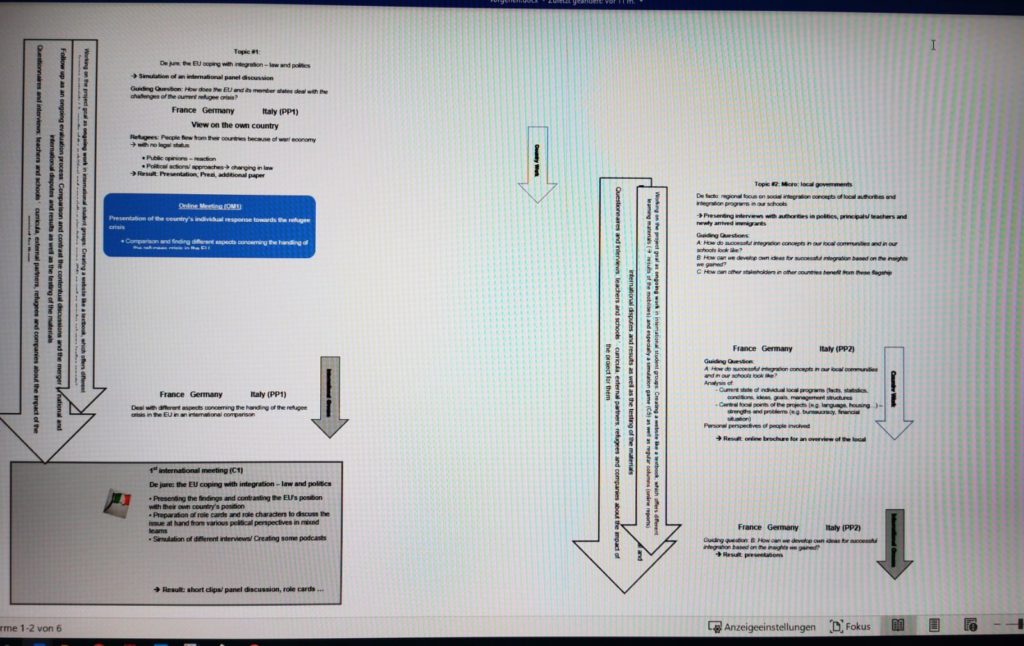During our project, we encountered many different integrationprojects, measures and ideas that demonstrate the creative and diverse approaches that can be used to respond to the challenges of integrating refugees. In a consistent country comparison, we examined the approaches and strategies of successful projects and measures across the EU and the respective countries to successfully shape integration processes of newly arrived immigrants.
To do this, we focused on several key areas, which we structured from the general to the specific:
- de jure: the EU’s approach to integration: law and politics in international politics.
- de facto: regional focus on social integration concepts of municipalities and integration programs in our schools
- private integration initiatives and NGOs
- integration in the labor market

The results of each module are freely available on this website for further use. This goes hand-in-hand with our philosophy of the project that collaboration only proves mutually productive when one side learns from the other. On the one hand, this concerns the exchange between the different stakeholders. On the other hand, the results will be available to interested parties and other teachers on this freely available website.
For a first overview you can find here a diagram of the procedure and structure of the project:
De jure: The Eu coping with integration – law and politics
1 The first module explored policy-making regarding the reception of refugees within the European legal framework. In order to create an understanding of political decision-making processes, students created different politician roles of the European Parliament during the first mobility in international groups, who gave short interviews and podcasts on the causes, legal possibilities, humanitarian necessities and pragmatic approaches to the crisis. The respective roles and political stances were summarized in role cards, which are available for further free (classroom) use.
De facto: Regional social integration concepts in local politics and in schools
2 The second module compared and evaluated the different integration approaches of local authorities and our schools. The selected projects and measures focus on different aspects of successful integration, such as language, housing, employment and financial support. We analyzed not only the challenges of integration processes, but also the problems faced by the projects themselves, such as bureaucracy, funding and resources. Based on this, we visited various regional integration concepts and projects. A main focus was on the integration concepts in education. Accordingly, interviews were conducted with schools concerned about their concepts. Furthermore, other projects and cooperations were visited and social workers were accompanied in their work. Another focus was on a discussion group of different actors within the project “Diversity Innerste” as well as the exchange with refugees.
Private integration initiatives and NGOs: Hanover, Montpellier, Modica
3 In the third module, private initiatives of NGOs in our region were analyzed to find flagship initiatives. The goal was to offer students insights into social engagement and thus promote their willingness to become socially engaged themselves and to understand the essential role that social responsibility plays. To this end, we jointly developed a motivational video to encourage young people to become socially involved. Furthermore, we sought dialogue with various local NGOs in Montpellier and talked about their social responsibility and their approaches to promoting integration processes. Due to the local characteristics, we dealt with the unique approach of helping refugees through art and talked to two of them, who were able to process their experiences through paintings and street art and develop their first own income. With the help of a jointly organized call for donations, we were also able to support a local NGO.
Labor market integration and access to vocational training
4 In module 4, the students addressed the question of how successful integration processes can be designed at the level of labor markets and vocational training and how companies respond to various challenges. In addition to various interviews, the students developed a business game in which representatives of the three countries developed a joint project to improve the integration of refugees in the labor markets.
For a more detailed look, please watch the video below.